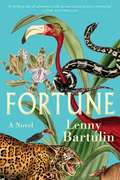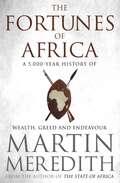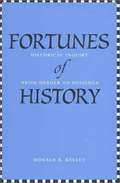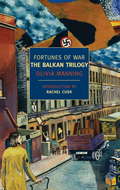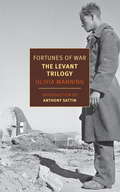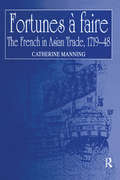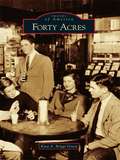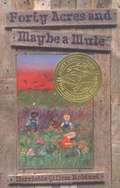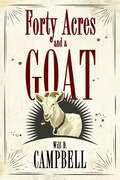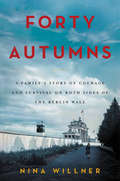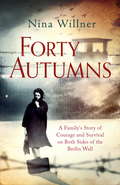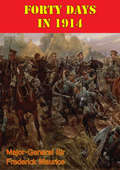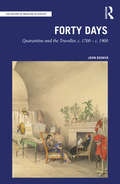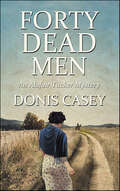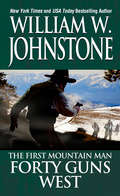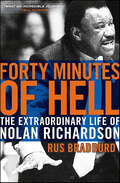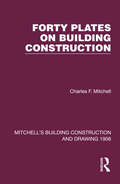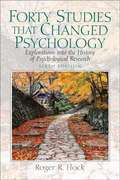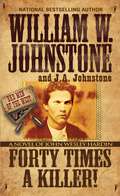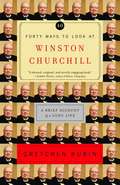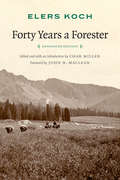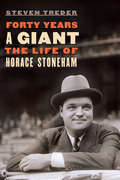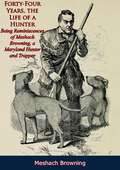- Table View
- List View
Fortune: A Novel
by Lenny BartulinAn audacious, entertaining historical epic spanning continents and centuries, for readers of David Mitchell, Column McCann, Kate Atkinson, and Eleanor Catton.Fortune is a dazzling, endlessly surprising, and gripping historical novel that opens the day Napoleon leads his victorious Grande Armée into Berlin after having conquered Prussia in battle. As crowds throng the streets to witness this momentous event, a handful of lives that briefly touch are sprung from their orbits and set on courses that will take them across Europe and around the world—their fates and desires sometimes intersecting—to strange lands in the Caribbean and South America, the Australian continent and van Diemen's Land, and back to a Europe now transformed.A frustrated general in Napoleon's army, billeted with one of Berlin's finest families. Elisabeth, a passionate young woman living with her aunt in that house. A young man of eighteen years and no particular talent, drawn to the smoky coffeehouses where students debate, whom she spies through a window fornicating with a serving girl at the moment Napoleon makes his grand entrance. An entrepreneur in New World exotica with a passion for shrunken heads, to whose house the young man was led for his tryst. A slave from Suriname, Mr. Hendriks, with his resentful white American companion, who have traveled to Berlin to sell a barrel of electric eels for their master. And a student enamored of philosophy, who will join Mr. Hendricks and the American on their return voyage. Through their stories amid war, cataclysm, colliding cultures, and misadventure, Lenny Bartulin imagines the ways that grand events in extraordinary times can shape the course of ordinary lives.
Fortunes of Africa: A 5,000 Year History of Wealth, Greed and Endeavour
by Martin MeredithIn this vast and vivid panorama of history, Martin Meredith, bestselling author of The State of Africa, follows the fortunes of Africa over a period of 5,000 years. With compelling narrative, he traces the rise and fall of ancient kingdoms and empires; the spread of Christianity and Islam; the enduring quest for gold and other riches; the exploits of explorers and missionaries; and the impact of European colonisation. He examines, too, the fate of modern African states and concludes with a glimpse into their future. This is history on an epic scale.
Fortunes of History: Historical Inquiry from Herder to Huizinga
by Donald R. KelleyDonald R. Kelley offers an authoritative examination of historical writing during the "long nineteenth century" - the years from the French Revolution to those just after the First World War. He provides a comprehensive analysis of the theories and practices of British, French, German, Italian, and American schools of historical thought, their principal figures, and their distinctive methods and self-understandings. Kelley treats the modern traditions of European world and national historiography from the Enlightenment to the "new histories" of the twentieth century, attending not only to major authors and schools but also to methods, scholarship, criticisms, controversies, ideological questions, and relations to other disciplines. --BOOK JACKET. Title Summary field provided by Blackwell North America, Inc. All Rights Reserved
Fortunes of War
by Olivia Manning Rachel CuskThe Balkan Trilogy is the story of a marriage and of a war, a vast, teeming, and complex masterpiece in which Olivia Manning brings the uncertainty and adventure of civilian existence under political and military siege to vibrant life. Manning's focus is not the battlefield but the café and kitchen, the bedroom and street, the fabric of the everyday world that has been irrevocably changed by war, yet remains unchanged.At the heart of the trilogy are newlyweds Guy and Harriet Pringle, who arrive in Bucharest--the so-called Paris of the East--in the fall of 1939, just weeks after the German invasion of Poland. Guy, an Englishman teaching at the university, is as wantonly gregarious as his wife is introverted, and Harriet is shocked to discover that she must share her adored husband with a wide circle of friends and acquaintances. Other surprises follow: Romania joins the Axis, and before long German soldiers overrun the capital. The Pringles flee south to Greece, part of a group of refugees made up of White Russians, journalists, con artists, and dignitaries. In Athens, however, the couple will face a new challenge of their own, as great in its way as the still-expanding theater of war.
Fortunes of War: The Levant Trilogy
by Olivia Manning Anthony SattinIn The Levant Trilogy Olivia Manning returns to the story of the young English couple Guy and Harriet Pringle, last seen, at the end of The Balkan Trilogy, departing from Athens ahead of the invading Nazi army. Now, in the spring of 1941, they arrive in Egypt as Rommel's forces slowly but surely approach Cairo across the Sahara from the west. Will the city fall? In the streets the people contemplate welcoming a new set of occupiers, while European refugees and well-heeled Anglo-Egyptians prepare to pack their bags. And at night, everyone who is anyone flocks to the city's famed hotels and seedy cabarets, seeking one last dance before the tanks roll in. Manning describes the Pringles' ever complicated marriage and their motley group of friends and foes with the same sharp eye that earned The Balkan Trilogy a devoted following. And she also traces the fortunes of a marvelously drawn new character, Simon Boulderstone, a twenty-year-old recruit who must grapple with the boredom, chaos, and fleeting exhilaration of war.
Fortunes à faire: The French in Asian Trade, 1719–48
by Catherine ManningThe history of the French in India has received far less scholarly attention than that of other European nations; English historiography, in particular, has often treated it as no more than a preliminary to the extension of British power. In addition, work hitherto has tended to focus on the trade with Europe, not the Asian trade - the 'country trade' carried on within Asia; the full importance of this trade for the Dutch and British is now being recognised. This book represents the first sustained study of French activities in Asian trade, and fills this gap in the historiography. Catherine Manning is concerned to relate the French traders to their social, regional and financial roots, and to trace their connections with other commercial groups in India, both European and Asian. The French evidence that she assembles, including much archival material, also makes a significant contibution to the debate about economic decline and renewal in 18th-century India. Her analysis stresses the importance of the Indian context, and shows that economic and political developments in South India were crucial to the French move from trade to war in the 1740s. Finally the book examines why the French failed in an enterprise which was to succeed so signally for the British only a few decades later.
Forty Acres (Images of America)
by Kara A. GreenForty Acres was developed into a neighborhood in the 19th century from a 40-acre parcel of farmland. Just as many other neighborhoods have ethnic associations, many Irish Wilmingtonians have their roots in Forty Acres. Some Forty Acres families stayed for generations, and the neighborhood was popular well into the 20th century. What makes Forty Acres different is its sense of community and the close-knit relationships developed between its residents. While it is admired for its historic charm, the neighborhood is an urban community made up of a mixed-use residential and commercial village within the city of Wilmington. Today Forty Acres continues to be a place where the word "neighbor" holds strength, value, and friendship.
Forty Acres and Maybe a Mule
by Harriette Gillem RobinetCould it be true? Pascal's runaway brother was back saying they were free! The slaves had been freed by President Lincoln! And besides, Gideon said, they could have forty acres of land and maybe a mule just for the asking. Gideon said land meant freedom. That night Pascal, twelve, and his friend Nelly, eight, ran away with Gideon. They were going to get a farm. They had to hide lest they be taken back into slavery. Also, land didn't seem as easy to find as Gideon had thought. What did it mean if you had to run and hide, if you were crippled and couldn't do what others did?Joined by other former slaves, Pascal, Gideon, and Nelly did find a farm. They even found a school that Pascal and Nelly could attend. They learned about dignity and the Freedmen's Bureau and the Union League and the Republicans. But they also discovered it was not easy for former slaves to stay free and to keep their land. Based on the author's research about events in the South in 1865, this is the story of what might have happened to one small group of African Americans.
Forty Acres and a Goat (Banner Books)
by Will D. CampbellIn Forty Acres and a Goat, Will D. Campbell (1924–2013) picks up where the award-winning Brother to a Dragonfly leaves off, accounting his adventures during the tumultuous civil rights era. As he navigates through the explosive 1960s, including pivotal moments like the integration of Little Rock High School and the assassination of Dr. Martin Luther King Jr., Brother Will finds his faith challenged. To further complicate matters, a series of jobs did not pan out as expected—pastorate in Louisiana, director of religious life at the University of Mississippi, and with the National Council of Churches—leaving Brother Will “with a call but no steeple.” In an effort to find his place as a preacher, he moves his family to a farm in rural Tennessee and fashions his own unique style of ministry and a maverick relationship with God, land, and all his fellow pilgrims.
Forty Autumns: A Family's Story of Courage and Survival on Both Sides of the Berlin Wall
by Nina WillnerIn this illuminating and deeply moving memoir, a former American military intelligence officer goes beyond traditional Cold War espionage tales to tell the true story of her family--of five women separated by the Iron Curtain for more than forty years, and their miraculous reunion after the fall of the Berlin Wall.Forty Autumns makes visceral the pain and longing of one family forced to live apart in a world divided by two. At twenty, Hanna escaped from East to West Germany. But the price of freedom--leaving behind her parents, eight siblings, and family home--was heartbreaking. Uprooted, Hanna eventually moved to America, where she settled down with her husband and had children of her own. Growing up near Washington, D.C., Hanna's daughter, Nina Willner became the first female Army Intelligence Officer to lead sensitive intelligence operations in East Berlin at the height of the Cold War. Though only a few miles separated American Nina and her German relatives--grandmother Oma, Aunt Heidi, and cousin, Cordula, a member of the East German Olympic training team--a bitter political war kept them apart. In Forty Autumns, Nina recounts her family's story--five ordinary lives buffeted by circumstances beyond their control. She takes us deep into the tumultuous and terrifying world of East Germany under Communist rule, revealing both the cruel reality her relatives endured and her own experiences as an intelligence officer, running secret operations behind the Berlin Wall that put her life at risk. A personal look at a tenuous era that divided a city and a nation, and continues to haunt us, Forty Autumns is an intimate and beautifully written story of courage, resilience, and love--of five women whose spirits could not be broken, and who fought to preserve what matters most: family. Forty Autumns is illustrated with dozens of black-and-white and color photographs.
Forty Autumns: A family's story of courage and survival on both sides of the Berlin Wall
by Nina WillnerIn Forty Autumns, Nina Willner recounts the history of three generations of her family - mothers, sisters, daughters and cousins - separated by forty years of Soviet rule, and reunited after the fall of the Berlin Wall.Shortly after the end of the Second World War, as the Soviets took control of the eastern part of Germany, Hanna, a schoolteacher's daughter, escaped with nothing more than a small suitcase and the clothes on her back. As Hanna built a new life in the West, her relatives (her mother, father and eight siblings) remained in the East. The construction of the Berlin Wall severed all hope of any future reunion. Hanna fell in love and moved to America. She made many attempts to establish contact with her family, but most were unsuccessful. Her father was under close observation; her mother, younger sister Heidi and the others struggled to adjust to life under a bizarre and brutal regime that kept its citizens cut off from the outside world. A few years later, Hanna had a daughter - Nina - who grew up to become the first female US Army intelligence officer to lead sensitive intelligence collection operations in East Berlin at the height of the Cold War. At the same time, Heidi's daughter, Cordula, was training to become a member of the East German Olympic cycling team. Though separated by only a few miles, Nina and her relatives led entirely different lives. Once the Berlin Wall came down, and the families were reunited, Nina Willner discovered an extraordinary story. In Forty Autumns she vividly brings to life many accounts of courage and survival, set against the backdrop of four decades that divided a nation and the world.
Forty Days In 1914 [Illustrated Edition]
by Major-General Sir Frederick MauriceIncludes The First World War On The Western Front 1914-1915 Illustrations Pack with 101 maps, plans, and photos.In 1919 renowned military writer Major-General Sir Frederick Maurice set out to piece together how the German Schlieffen plan fell apart in the opening phases of the First World War. Using his extensive military background he deduced how the German High Command reacted to the opening clashes in 1914 and eventually recoiled after the Battle of the Marne. Still a fascinating read even after so many years, the details of the British and French commanders remain filled with the tension and drama as they sought to stem the seemingly unstoppable German juggernaut.
Forty Days with the Enemy
by Richard DudmanThis book is an interesting and detailed account of the 1970 capture, detention, and release of Richard Dudman, Elizabeth Pond, and Michael Morrow. Readers interested to know the fates of the many journalists lost in Southeast Asia would find the book very informative and absorbing.
Forty Days: Quarantine and the Traveller, c. 1700 – c. 1900 (The History of Medicine in Context)
by John BookerForty Days: Quarantine and the Traveller, c. 1700 –1900 provides a timely reminder that no traveller in past centuries could return from the East without spending up to 40 days in a lazaretto to ensure that no symptoms of plague were developing. Quarantine was performed in virtual prisons ranging from mud huts in the Danube basin to a converted fort on Malta, evoking every emotion from hatred and hostility through to resignation and even contentment. Drawing on the diaries and journals of some 300 men and women of many nationalities over more than two centuries, the author describes the inadequate accommodation, poor food and crushing boredom experienced by detainees. The book also draws attention to comradeship, sickness, and death in detention, as well as Casanova’s unique ability to do what he did best even in the lazaretto of Ancona. Other well-known detainees included Hans Christian Andersen, Mark Twain and Sir Walter Scott. Lavishly illustrated, the work includes a gazetteer of 49 lazarettos in Europe and Asia Minor, with inmates’ comments on each. This book will appeal to all those interested in the history of medicine and the history of travel.
Forty Dead Men: An Alafair Tucker Mystery (16pt Large Print Edition) (Alafair Tucker Mysteries #10)
by Donis CaseyBarnes & Noble pick for "20 Favorite Indie Books of 2018""Casey expertly nails the extended Tucker family—some 20 people—and combines these convincing characters, a superb sense of time and place, and a solid plot in this marvelously atmospheric historical." —Publishers Weekly STARRED reviewSome people who have experienced a shocking, dangerous, or terrifying event develop Post Traumatic Stress Disorder. It is recognized today as a debilitating but potentially treatable mental health condition. Military veterans are a vulnerable group. But PTSD can deliver a knockout blow to anyone, as the remarkable unfolding of the tenth Alafair Tucker Mystery, Forty Dead Men, shows.World War I is over. Alafair is overjoyed that her elder son, George Washington Tucker, has finally returned home from the battlefields of France. Yet she is the only one in the family who senses that he has somehow changed.Gee Dub moves back into his old bunkhouse quarters, but he's restless and spends his days roaming. One rainy day while out riding he spies a woman trudging along the country road. She's thoroughly skittish and rejects his help. So Gee Dub cannily rides for home to enlist his mother in offering the exhausted traveler shelter.Once made comfortable at the Tucker farm, Holly Johnson reveals she's forged her way from Maine to Oklahoma in hopes of finding the soldier she married before he shipped to France. At the war's end, Daniel Johnson disappeared without a trace. It's been months. Is he alive? Is she a widow?Holly is following her only lead—that Dan has connected with his parents who live yonder in Okmulgee. Gee Dub, desperate for some kind of mission, resolves to shepherd Holly through her quest although the prickly young woman spurns any aid. Meanwhile, Alafair has discovered that Gee Dub sleeps with two cartridge boxes under his pillow—boxes containing twenty "dead men" each. The boxes are empty, save for one bullet. She recognizes in Gee Dub and Holly that not all war wounds are physical.Then Holly's missing husband turns up, shot dead. Gee Dub is arrested on suspicion of murder, and the entire extended Tucker family rallies to his defense. He says he had no reason to do it, but the solitary bullet under Gee Dub's pillow is gone. Regardless, be he guilty or innocent, his mother will travel any distance and go to any lengths to keep him out of prison.
Forty Guns West (Preacher/The First Mountain Man #4)
by William W. JohnstonePreacher is a wanted man in this straight-shooting Western adventure from the New York Times and USA Todaybestselling author of Absaroka Ambush. A Friendly Place . . . During a trip back east for a family reunion, Preacher learns that even the civilized Midwest can attract a motherlode of trouble . . . especially when a gang of local bully boys decides to pick a fight. Now, wealthy landowner Elam Parks lies dead—and there&’s a $5,000 reward on the head of the man accused: the first mountain man.. . . To Die The fortune in blood money has dispatched a small army of bounty hunters after Preacher. Now, back in his once-peaceful homestead in the High Lonesome, as he sights down the barrel of his &’33 Hall North breechloader, Preacher is ready for target practice. And he can&’t think of a more scenic place to pick off the bloodthirsty manhunters, one by one . . . Praise for the novels of William W. Johnstone &“[A] rousing, two-fisted saga of the growing American frontier.&”—Publishers Weekly on Eyes of Eagles &“There&’s plenty of gunplay and fast-paced action as this old-time hero proves again that a steady eye and quick reflexes are the keys to survival on the Western frontier.&”—Curled Up with a Good Book on Dead Before Sundown
Forty Minutes of Hell: The Extraordinary Life of Nolan Richardson
by Rus Bradburd“Nolan Richardson’s extraordinary life and success as the University of Arkansas’ coach are an important chapter in the history of our country’s struggle for racial equality, with all the excitement of the Final Four. What an incredible journey!”—President Bill ClintonForty Minutes of Hell by Rus Bradburd is an intricate exploration of the politics of race and sports, from the Jim Crow era until today, witnessed through the life of legendary African-American basketball coach and NCAA Title winner Nolan Richardson. A remarkable story of pride, courage, and accomplishment in the face of discrimination, Forty Minutes of Hell is also a fascinating window into the world of elite collegiate sports. NBA legend Charles Barkley calls this inspiring and important biography, “A great story about America and its hidden histories….Every American should thank [Richardson] for showing us it was possible.”
Forty Plates on Building Construction: A Textbook on the Principles and Details of Modern Construction First Stage (Or Elementary Course) (Mitchell's Building Construction and Drawing #3)
by Charles F. MitchellOriginally published in 1891, this volume was a companion volume to the Elementary and Advanced volumes of Building Construction and Drawing. The exquisite technical drawings give a technical level of detail which is invaluable for the study of late 19th Century construction methods and materials and cover brickwork and masonry, carpentry, joinery, plumbing, roof and iron work.
Forty Studies That Changed Psychology
by Roger R. HockRoger Hock’s Forty Studies provides a glimpse of the science of psychology, unraveling the complexities of human nature. This book provides a more in-depth look and analyses that cannot be found by reading a textbook or research alone. It has the original studies, research & analysis about the most famous studies in psychological history.
Forty Studies That Changed Psychology: Explorations into the History of Psychological Research (6th Edition)
by Roger R. HockThis book, useful for courses in Introductory Psychology, History and Systems in Psychology, and Research Methods, closes the gap between psychology textbooks and the research that made them possible by offering a first hand glimpse into 40 of the most famous studies in the history of the field, and subsequent studies that expanded upon each study's influence.
Forty Times a Killer!: A Novel of John Wesley Hardin (Bad Men of the West #1)
by William W. Johnstone J.A. JohnstoneBASED ON THE REAL LIFE OF AN ICON OF AMERICAN FOLKLORE. William Johnstone and J.A. Johnstone are the acclaimed masters of the American frontier and national bestsellers. Now, they take on the deadliest and most feared outlaw to ever walk the Old West—John Wesley Hardin.First he became a killer. Then he became a legend. He was 15 when he killed his first man. Before his murderous ways ended, Hardin killed 42 men in cold blood—one, the legend goes, because he snored too loudly. From then on John Wesley Hardin stayed true to his calling, slaughtering man after man after man, spending most of his life being pursued by both local lawmen and federal troops. Hardin lived a fever dream of lightning fast draws and flying lead. By the age of seventeen, Hardin earned a deadly reputation for cold-blooded killing that drew backstabbers and gunslingers--all for a chance to gun down the man who had turned killing into an all-American legend . . .
Forty Ways to Look at Winston Churchill
by Gretchen RubinWarrior and writer, genius and crank, rider in the British cavalry's last great charge and inventor of the tank--Winston Churchill led Britain to fight alone against Nazi Germany in the fateful year of 1940 and set the standard for leading a democracy at war. Like no other portrait of its famous subject, Forty Ways to Look at Winston Churchill is a dazzling display of facts more improbable than fiction, and an investigation of the contradictions and complexities that haunt biography. Gretchen Craft Rubin gives readers, in a single volume, the kind of rounded view usually gained only by reading dozens of conventional biographies. With penetrating insight and vivid anecdotes, Rubin makes Churchill accessible and meaningful to twenty-first-century readers with forty contrasting views of the man: he was an alcoholic, he was not; he was an anachronism, he was a visionary; he was a racist, he was a humanitarian; he was the most quotable man in the history of the English language, he was a bore.In crisp, energetic language, Rubin creates a new form for presenting a great figure of history--and brings to full realization the depiction of a man too fabulous for any novelist to construct, too complicated for even the longest narrative to describe, and too valuable ever to be forgotten. From the Hardcover edition.
Forty Years a Forester: With "the Passing Of The Lolo Trail"
by Elers KochElers Koch, a key figure in the early days of the U.S. Forest Service, was among the first American-trained silviculturists, a pioneering forest manager, and a master firefighter. By horse and on foot, he helped establish the boundaries of most of our national forests in the West, designed new fire-control strategies and equipment, and served during the formative years of the agency. Forty Years a Forester, Koch’s entertaining and illuminating memoir, reveals one remarkable man’s contributions to the incipient science of forest management and his role in building the human relationships and policies that helped make the U.S. Forest Service, prior to World War II, the most respected bureau in the federal government. This new, fully annotated edition of Koch’s memoir offers an unparalleled look at the Forest Service’s formative ambitions to regulate the national forests and grasslands and reminds us of the principled commitment that Koch and his peers exemplified as they built the national forest system and nurtured the essential conservation ethic that continues to guide our use of the public lands.
Forty Years a Giant: The Life of Horace Stoneham
by Steven TrederWhen New York Giants owner Charles A. Stoneham came home one night in 1918 and told his teenage son, Horace, &“Horrie, I bought you a ballclub,&” he set in motion a family legacy. Horace Stoneham would become one of baseball&’s greatest figures, an owner who played an essential role in integrating the game, and who was a major force in making our pastime truly national by bringing Major League Baseball to the West Coast. Horace Stoneham began his tenure with the Giants in 1924, learning all sides of the operation until he moved into the front office. In 1936, when his father died of kidney disease, Horace assumed control of the Giants at age thirty-two, becoming one of the youngest owners in baseball history. Stoneham played a pivotal role in not just his team&’s history but the game itself. In the mid-1940s when the Pacific Coast League sought to gain Major League status, few but Stoneham and Branch Rickey took it seriously, and twelve years later the Giants and Dodgers were the first two teams to relocate west. Stoneham signed former Negro Leaguers Monte Irvin and Hank Thompson, making the Giants the second National League franchise to racially integrate. In the late 1940s, the Giants hired their first Spanish-speaking scout and soon became the leading team in developing Latin American players. Stoneham was shy and self-effacing and avoided the spotlight. His relationships with players were almost always strong, yet for all his leadership skills and baseball acumen, sustained success eluded most of his teams. In forty seasons his Giants won just five National League pennants and only one World Series. The Stoneham family business struggled, and the team was forced to sell off its beloved stars, first Willie Mays, then Willie McCovey, and finally Juan Marichal. Then Stoneham had no choice but to sell the club in 1975. While his tenure came to an unfortunate end, he is heralded as a pioneer and leader whose story tells much of baseball history from the 1930s through the 1970s.
Forty-Four Years, the Life of a Hunter: Being Reminiscences of Meshach Browning, a Maryland Hunter and Trapper [Illustrated Edition]
by Meshach BrowningMeshach Browning spent decades as a professional hunter and trapper of bears, boars and deer in rural Maryland during the early 1800s—this is his story, in his own words. Born in modest circumstances, Browning grew up at a time when the USA as a nation was in its infancy, with much of the population living in rural areas. From his youth, the author vowed to be self-sufficient, leaving his home and first love to hone his hunting skills. Returning with money gained from selling pelts and meat, it is then that Meshach contemplates hunting as a career. The equipment the author used is much inferior to today's. Meshach's use of a musket gun—whose reliability is demonstrated as poor in several instances—leads him to rely on his skills in close quarters combat. On multiple hunts, described with stunning vividness in these pages, Browning's ability to battle animals in melee saves his life. Dangers of his trade are balanced by its lucrativeness: bear meat and pelt for instance fetched high prices.-Print ed.
